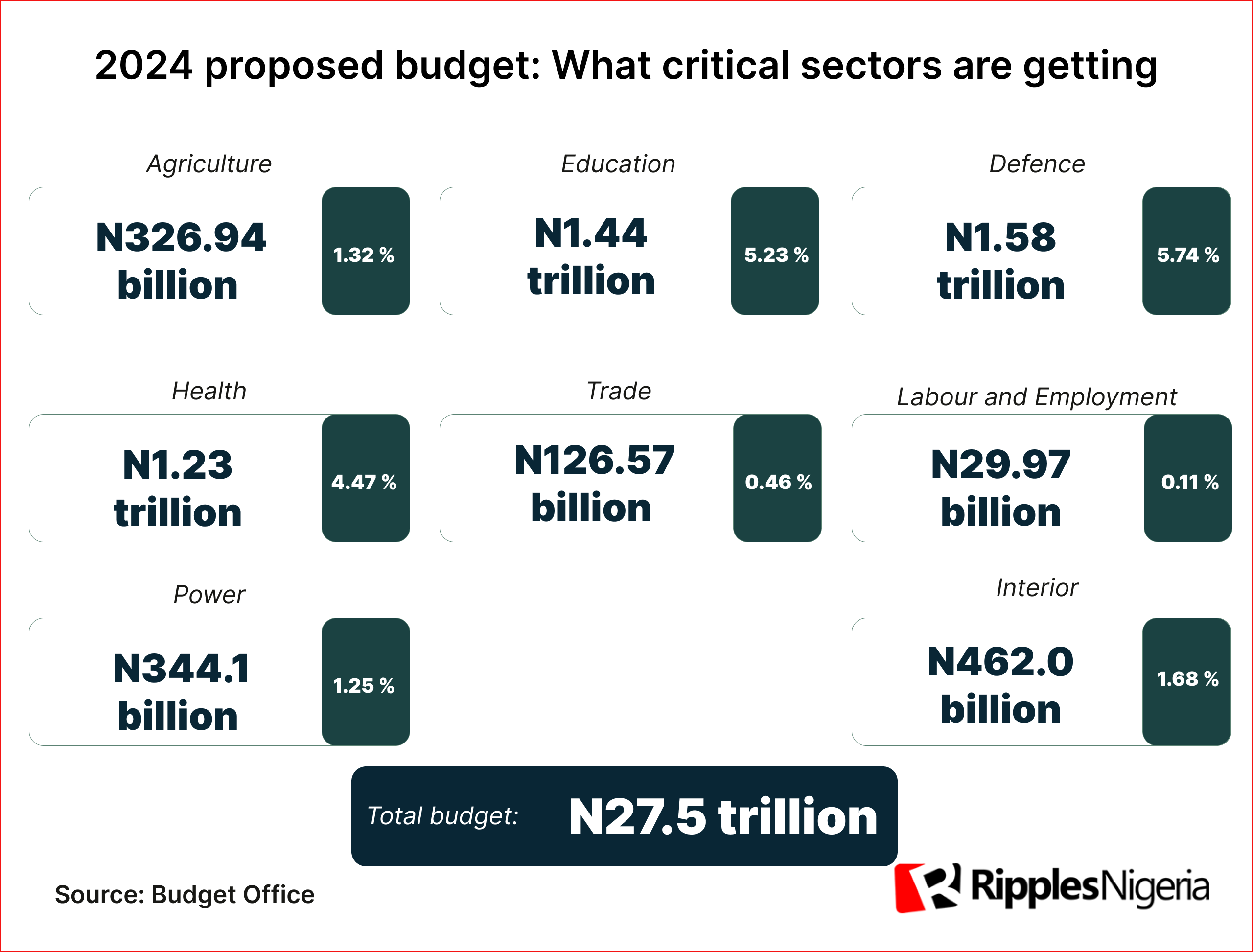Ripples Metrics
RipplesMetrics: 2024 proposed budget: What critical sectors are getting

In November, President Bola Tinubu presented his first appropriation bill to a joint session of the National Assembly, as the president of Nigeria, proposing to spend N27.5 trillion in the 2024 fiscal year.
The budget is about N6 trillion higher than the N21.83 trillion approved by former president Muhammadu Buhari for 2023. RipplesMetrics has reported the trends of increasing budget proposals and approval in the last eight years.
However, during the budget presentation, Tinubu said that the target of the budget of the “Renewed Hope” budget is to reduce the inflation rate to 21.4 per cent, which is currently climbing above 28 per cent as of the last data released by the National Bureau of Statistics in November.
Also, he noted that the Gross Domestic Product rate is targeted at 3.76 per cent and a moderate exchange rate of N750/1 USD ($). The oil benchmark is targeted at $77.96 per barrel with a production of 1.78 million barrels per day. This plan, he told the assembly, is hinged on plans that the Dangote refinery and the Port Harcout refinery would have started refining by January 2024.
Breaking it down further, the proposed recurrent expenditure is N9.92 trillion with a capital expenditure of N8.7 trillion. Likewise, debt servicing would be N8.25 trillion and the budget would run on a deficit of N9.18 trillion.
The president said, “In preparing the 2024 Budget, our primary objective has been to sustain our robust foundation for sustainable economic development. A critical focus of this budget and the medium-term expenditure framework is Nigeria’s commitment to a greener future.”
However, in August, shortly after the swearing-in of the ministerial cabinet, the president rolled out his eight-point agenda to turn around the economy of the country. This came despite the implementation of fiscal policies around subsidy and foreign exchange announced by the president.
The agenda includes food security; ending poverty; economic growth and job creation; access to capital; improving security; improving the playing field on which people and particularly companies operate; rule of law; and fighting corruption.
READ ALSO:RipplesMetrics: Trends in ‘accidental’ military airstrike in Nigeria
For this report, RipplesMetrics looked through these agenda and the budget, juxtaposing it with the allocations made to the critical sector of the economy. Recall that the Minister of Budget and Economic Planning, Abubakar Atiku Bagudu, revealed some sectoral allocations made in the budget.
Budget for critical sectors
According to data uploaded from the budget office, the sectors include:
Agriculture: The Ministry of Agriculture and Food Security was budgeted to spend N326.94 billion. This is 1.32 per cent of the total proposed budget. The capital expenditure for the ministry is N252.69 billion. Recall that the Food And Agriculture Organization has projected that 25.3 million Nigerians are at risk of acute food crises during the lean season of this year.
Education: This ministry received N1.44 trillion of which it has a capital expenditure of N330.36 billion. The total amount is 5.23 per cent of the total budget. The latest data from UNESCO says that more than 20 million children are out of school in Nigeria.
Defence: The Ministry of Defence got N1.58 trillion which represents 5.74 per cent of the total budget. Nigeria, over the past years, has recorded several insecurity challenges. As of last year, more than 10,000 people were killed due to the persistent insecurity challenges within the country.
Health: The Ministry of Health and Socal Walfare received N1.23 trillion with a capital expenditure of N434.79 billion. This is 4.47 per cent of the total budget. Nigeria’s health sector, beyond infrastructural problem, have experienced a brain drain with more than 5000 health worker migrating out of the country in eight years.
Trade: The Ministry of Industry, Trade and Investment received N126.57 billion which represents 0.46 per cent of the budget.
Labour and Employment: This ministry received N29.97 billion representing 0.11 per cent of the budget. This is coming despite the country’s unemployment rate which was 33.3 per cent as of 2020 but dropped to 4.1 per cent in 2023 Q1, generating several controversies.
Power: The ministry got N344.1 billion representing 1.25 per cent of the budget despite the multiple power outages in the Nigerian transmission unit.
Interior: The Ministry of Interior received N462.0 billion which represents 1.68 per cent of the budget.
By James Odunayo
Join the conversation
Opinions
Support Ripples Nigeria, hold up solutions journalism
Balanced, fearless journalism driven by data comes at huge financial costs.
As a media platform, we hold leadership accountable and will not trade the right to press freedom and free speech for a piece of cake.
If you like what we do, and are ready to uphold solutions journalism, kindly donate to the Ripples Nigeria cause.
Your support would help to ensure that citizens and institutions continue to have free access to credible and reliable information for societal development.